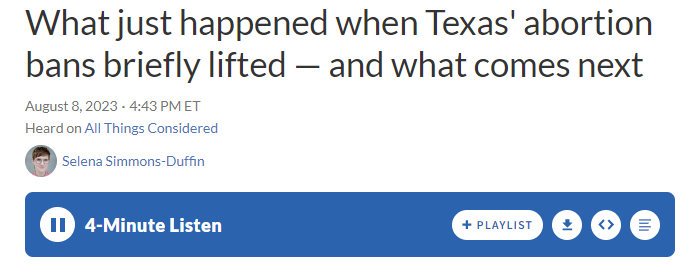This Week in Abortion: Policies for Parents and Ohio, Go Ohio!
A collection of good reads, events from the week, and policy insights.
Welcome back to your weekly roundup of good reads, legal updates, and legislative tracking on abortion. In addition to our feature sharing some developments for pro-maternal care and pro-parent policy, we are saying Congrats to voters in Ohio for protecting a tool of democracy in their state and setting an undeniably pro-access tone for November’s election. (Don’t forget to show some love, Click the ❤️ button!)
Feature - More on Policies for Parents and Pregnancy
In a statement that will shock no parents or pregnant people - America treats us terribly, at least compared to the EU. But, that might be changing, slowly. We had a related guest post on this last month. This week happened to be a week of small steps for pro-parent and maternal care policies. So, we are raising it again.
First, the FDA approved an oral pill for postpartum depression (PPD). While there are other treatments available, this is one of the first drugs to explicitly target PPD. So, it seems exciting to us in the ‘recognizing that all our bodies work in different ways’ sense. But also, as one expert reminded Washington Post readers, it’s an option, not a cure-all: “We need to provide better social support to women…We need longer maternity leave, more flexible work schedules and universal child care.”
Which brings us to the next update. As Beth Kenefick explained in July, there are only 12 states that have paid-leave programs for new parents, and they are all pro-access states. As one of the few and the proud, it’s exciting to see Oregon gearing up to accept applications for the state’s paid leave program starting on Monday.
And finally, some good news that starts with a case study of how not to treat pregnant employees. This week, the Texas Tribune shared a story about a prison guard who is suing the state. According to the suit, in 2021 the refusal of Salia Issa’s supervisors to accommodate her request to leave her post for the hospital ended with her losing her pregnancy. Thankfully, Congress acted earlier this year to require workplace accommodations for pregnant employees. This week a federal commission released guidance on how employers can treat employees and what medical information, etc, they can require. The introductory report to the rules references pee breaks as an example of one of the common and pretty simple accommodations that workers want.
Oh, by the way, can you guess what Texas argued in its defense of Issa’s lawsuit? They say they aren’t responsible because A. Fetus. Is. Not. A. Human. Individual. Yes you heard that right. Uncovered by reporter Jolie Mccullough, the State via AG Paxton wrote in it’s court filing, “Just because several statutes define an individual to include an unborn child does not mean that the Fourteenth Amendment does the same.” We try not to dwell on hypocrisy in this newsletter but, Come On!
State by State by Nation Updates
👍Ohio voters shut down the attempt to increase the threshold for winning ballot initiatives, an effort that even the secretary of state said was exclusively about abortion.
Next, pending a recent lawsuit, Ohio will have a citizen’s ballot initiative to secure abortion rights on the ballot in local elections this November.
The failure of the legislature to change the threshold is a win for democracy across the board and is also a good sign heading into November, hopefully, the energy can be sustained until then.
Slate and Politico pieces this week focus on what’s next for ballot initiatives and abortion in Arizona - where proposed ballot language was just filed and will need to be approved for signatures collection, and Missouri - where the signature collection is held up after another lawsuit was filed against the initiative.
👍Two stories this week highlight the importance of policy administration and the “behind the curtain” side of implementation policies.
Pennsylvania terminated a 30-year relationship with a contractor that encourages abortion alternatives. While their anti-access activities were one among many reasons cited, long-term state contractors can be really hard to change. This is really encouraging to see states doing.
In Colorado, three state boards met to determine whether abortion reversal is “standard practice.” You may remember that Colorado became the first state to pass a law banning “abortion pill reversal.” The fine print allows this law to be overruled if the major state medical boards deem the practice “standard practice.” Not surprisingly, the first rules that have come out from these boards have not taken that stance. Reminder for us all to read the laws and understand how implementation can be used strategically.
👎Texas had a whirlwind week, with a judge temporarily halting the full ban to allow limited exceptions, only for it to be appealed directly to the Supreme Court 12 hours later. Until the court issues a ruling - which will be who knows when - abortion is still fully banned in Texas.
👎 An Illinois law focused on limiting misinformation from crisis pregnancy centers was halted by a Judge while the case moves forward. This happening in many states as they’ve started regulating messaging from these groups. For more background on crisis pregnancy centers, see our feature a few months ago.
👉Idaho educators are asking a judge to prevent the state from enforcing a law that “bans public employees from promoting abortion.” The law prevents staffers from referring students to abortion access and, they say, goes even further by threatening any open discussion of the subject, even in the purely academic context.
Trends and Reports
👎 The peer-reviewed journal Contraception published a new report that shows Black and low-income women are less likely to have medicated abortions (compared to procedure-based abortions). This is another paper to add to the pile demonstrating the disproportional impact women of color face in the reproductive justice space. Axios also has a summary of the article.
👎 The Cut has a great profile of Clinic for Women, which is moving operations from Indiana to Danville, IL, and has faced a mountain of political and even physical opposition along the way. An activist rammed into the side of the building this spring and attempted to set it on fire. The clinic’s story is a common one and one of the key challenges pro-access states will face in the coming year even as they invest in programs to build up capacity. For anyone who would like to contribute to the Clinic’s rebuild, link is here and below.

More Interesting Reads
AP’s Deepa Bharath wrote an interesting profile on the religious views of GOP Presidential candidate Vivek Ramaswamy, including his views on abortion. While we often share stories about the intersection of religion and abortion in this newsletter, they mostly focused on “Abrahamic” religions. The AP doesn’t get to the whole story with Hinduism and abortion specifically. But, to quote from the piece, “Ria Chakrabarty, policy director of Hindus for Human Rights, said she is concerned by Ramaswamy’s attempt to ‘package Hinduism in the family values mold, talking about it as a monotheistic religion to appeal to the Abrahamic faiths.’”
Since we are talking politics, The New York Times published a profile on Tricia Cotham a few weeks ago. She is the North Carolina legislator who jumped from the Dems to the Republicans three months into her term. This piece is not exactly about abortion, but it’s an important cautionary tale and good background for one of the races to watch in 2024.


